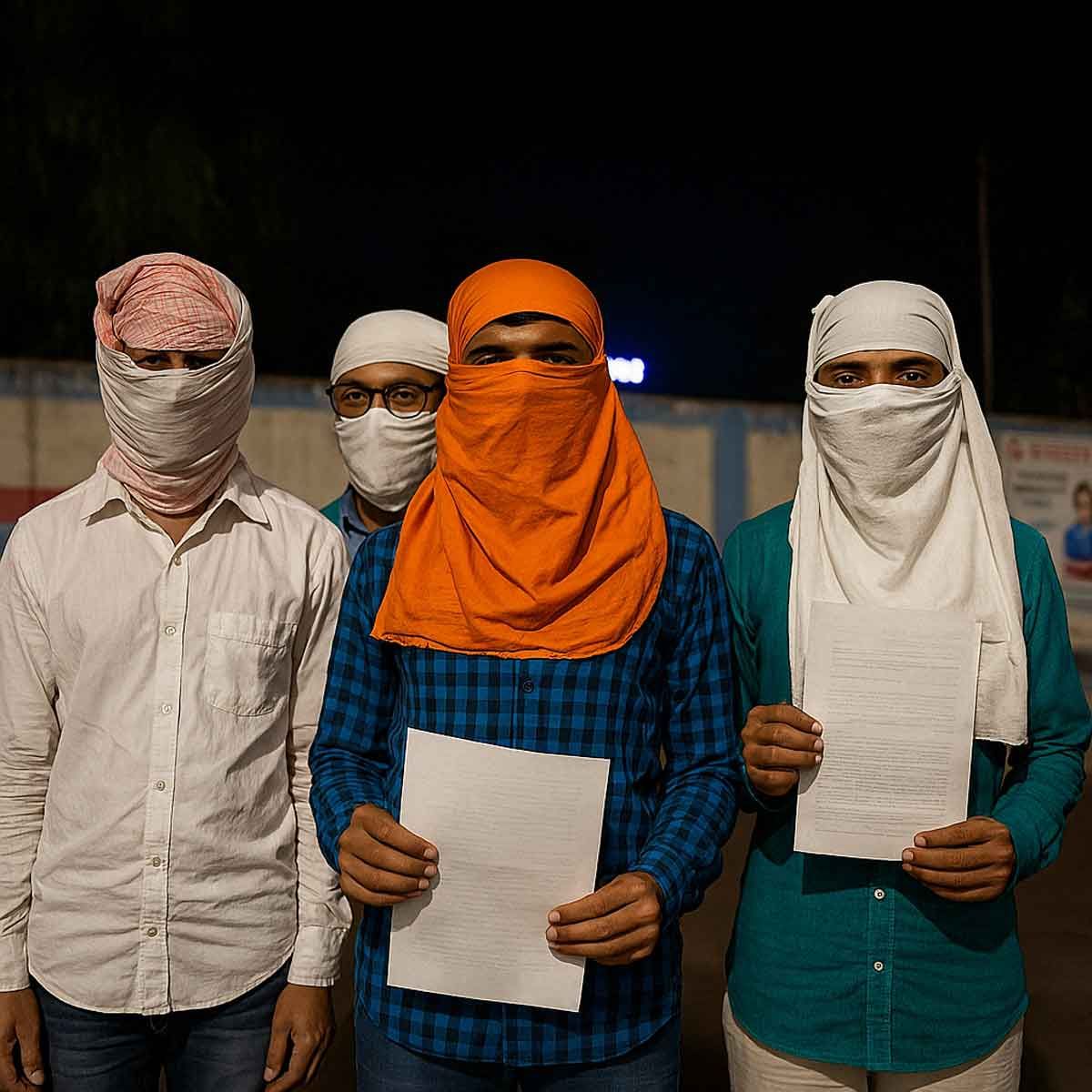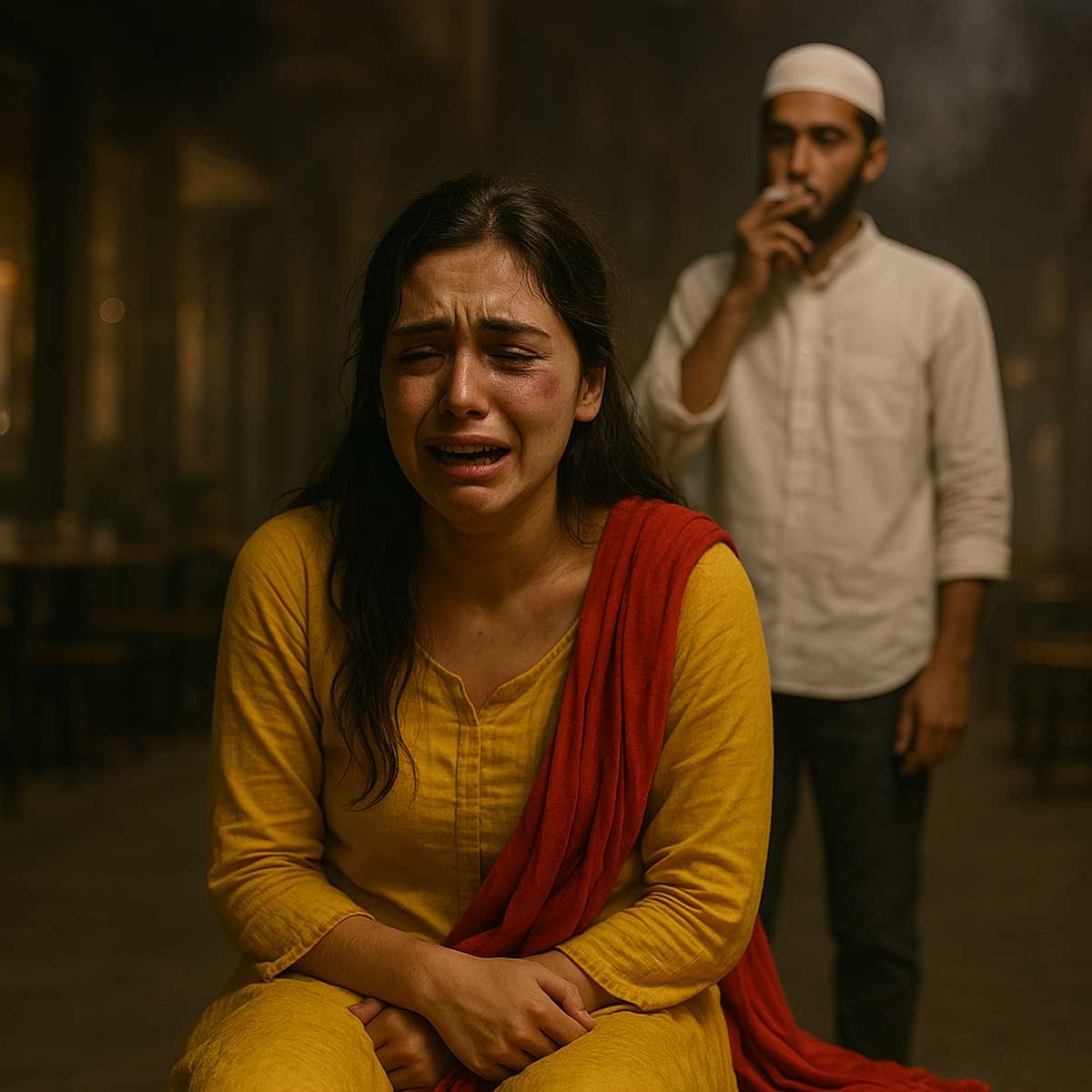More Coverage
Twitter Coverage
Satyaagrah
Written on
Satyaagrah
Written on
Satyaagrah
Written on
Satyaagrah
Written on
Satyaagrah
Written on
JOIN SATYAAGRAH SOCIAL MEDIA
"बँटवारा": Arfa Khanum Sherwani calls for Sir Syed Ahmed Khan’s leadership, sparking controversy as Khan, founder of AMU and proponent of the Two Nation Theory, fueled the Hindu-Muslim divide with Islamists aiming to make India an Islamic nation by 2047

The Wire's Arfa Khanum Sherwani, a figure often associated with pushing an anti-Hindu and anti-India narrative, stirred up fresh controversy on 17th October by reminiscing about Sir Syed Ahmed Khan. Sherwani, known for her frequent remarks that seem to deepen divisions rather than bridge them, expressed her view that the Muslim community in India needed a leader like Khan in today’s climate. She suggested that Khan, who founded Aligarh Muslim University (AMU), was the only leader who could provide proper guidance to the community amidst what she described as a wave of alleged hatred being propagated by the current government. The occasion for her remarks was the 207th birth anniversary of Sir Syed Ahmed Khan, a figure with a complex legacy.
|
Sherwani took to social media to voice her thoughts, posting on X (formerly Twitter):
“Today India and Indian Muslims need Sir Syed Ahmed Khan more than ever before. We are at a juncture in our history where the state and the society have totally abandoned its Muslims. The directionless and hopeless community is desperately searching for a leader. #SirSyedDay,” she wrote. Her words seemed to echo her frequent critiques of the Indian government, claiming that Muslims have been abandoned by both the state and society.
However, Sherwani was not alone in her praise for Sir Syed Ahmed Khan. Numerous other leftist figures, Islamists, and their supporters chimed in, lauding the man who once supported the "Two Nation Theory," which led to the division of India based on religious lines. Among them was Zeeshan Ahmed Khan, National Vice Chairman of NSUI Social Media. NSUI, the student wing of the Indian National Congress, holds an influential role in Indian student politics. Zeeshan took the opportunity to celebrate Sir Syed Ahmed Khan's contribution to education, highlighting the establishment of AMU as a key achievement.
|
In his post, Zeeshan Ahmed Khan wrote:
“Education is the greatest legacy that parents can leave for their children. Tribute to the founder of AMU Dr Sir Syed Ahmed Khan on his 207th birth anniversary, Sir Syed Day. Sir Syed Ahmed Khan has left a great legacy to the country and the world in the form of AMU!” Zeeshan’s words seemed to place a heavy emphasis on education as a legacy, celebrating Khan for his role in founding the prestigious institution, AMU.
The 207th birth anniversary of Sir Syed Ahmed Khan was also marked by celebrations at the Aligarh Muslim University itself. A video of these celebrations has been circulating on social media, further amplifying the conversation around Sir Syed Ahmed Khan and his impact on both Indian history and the Muslim community.
However, it is crucial to clarify a common misconception that has been perpetuated by Congress and Left-leaning historians. These groups often lay the blame on Swatantryaveer Vinayak Damodar Savarkar, accusing him of allegedly promoting the idea of the ‘Two Nation Theory’. In reality, it was Sir Syed Ahmed Khan, an influential Islamist leader, who first proposed this divisive theory, not Savarkar.
|
In 1876, Syed Ahmed Khan expressed his conviction about the irreconcilable differences between Hindus and Muslims. He stated, “I am convinced now that Hindus and Muslims could never become one nation as their religion and way of life was quite distinct from each other.” This sentiment laid the foundation for what would later evolve into the ‘Two Nation Theory,’ an ideology that would eventually contribute to the partition of India.
Seven years after his initial assertion, in 1883, Sir Syed Ahmed Khan reiterated similar views. He emphasized the idea that Hindus and Muslims were two distinct nations, tied only by geographical proximity but separated by their internal beliefs and way of life. He stated, “Friends, in India, there live two prominent nations distinguished by the names of Hindus and Mussalmans… To be a Hindu or a Muslim is a matter of internal faith which has nothing to do with mutual relationships and external conditions… Hence, leave God’s share to God and concern yourself with the share that is yours… India is the home of both of us… By living so long in India, the blood of both have [sic] changed.” These words reflect the deep-rooted belief that religious differences between the two communities were so profound that they could not coexist as a single, unified nation.
Sir Syed Ahmed Khan was not just another Islamic scholar; he was a highly influential, yet controversial figure. His rhetoric often veered into radicalism, and his speeches contained a clear animosity towards Hindus. On March 14, 1888, during a speech, he made shocking and inflammatory statements, highlighting his view of Muslim supremacy and the violent consequences that could arise from Hindu-Muslim relations. He declared, “…You must remember that although the number of Mahomedans is less than that of the Hindus, and although they contain far fewer people who have received a high English education, yet they must not be thought insignificant or weak. Probably they would be by themselves enough to maintain their own position. But suppose they were not. Then our Mussalman brothers, the Pathans, would come out as a swarm of locusts from their mountain valleys, and make rivers of blood flow from their frontier in the north to the extreme end of Bengal.”
This particular speech is remembered for its disturbing imagery and its clear message of potential violence. His words presented a grim scenario where Muslims, despite being fewer in number, could rely on external forces like the Pathans to violently assert their dominance over the Hindus, thus reinforcing the divide between the two communities.
|
In the same speech, Sir Syed Ahmed Khan further reinforced his belief in the impossibility of Hindus and Muslims sharing equal power in a post-colonial India. He said, “Now, suppose that the English community and the army were to leave India, taking with them all their cannons and their splendid weapons and all else, who then would be the rulers of India?… Could two nations—the Mohammedans and the Hindus—sit on the same throne and remain equal in power under these circumstances? Most certainly not. One of them must conquer the other. To hope that both could remain equal is to desire the impossible and the inconceivable. But until one nation has conquered the other and made it obedient, peace cannot reign in the land.”
In these remarks, Sir Syed Ahmed Khan was clear in his belief that peaceful coexistence between Hindus and Muslims was unachievable unless one group asserted dominance over the other. His rhetoric fueled the notion that India could not be a united nation, laying the ideological groundwork for the partition that would occur decades later.
Sir Syed Ahmed Khan held the firm belief that the idea of Hindus and Muslims coexisting as one nation was not only improbable but completely inconceivable. He was convinced that the solution to the rising tensions and differences between the two communities was the creation of two separate nations—one for Hindus and the other for Muslims. He saw this as the only way to bring about lasting peace in the region, as he believed the two groups were too distinct to coexist harmoniously.
Throughout many of his speeches, Sir Syed Ahmed Khan repeatedly expressed his view that the disparities between Hindus and Muslims were not just superficial but deeply ingrained in their religions, cultures, and ways of life. He asserted that these differences were so significant that they demanded the creation of separate social, political, and cultural spheres for each community. For him, this was not just a matter of opinion but a fundamental reality that needed to be acknowledged.
Following the 1857 War of Independence, Sir Syed Ahmed Khan observed how severely the Muslim community had suffered in the aftermath of the rebellion. The consequences were dire, and it was clear to him that if the Muslims continued to oppose the British Empire, their situation would only worsen. In response to this, he advocated for the Muslim community to improve their relations with the British, who were the ruling power at that time. He saw cooperation with the British as the key to ensuring the survival and prosperity of Indian Muslims, especially in a political environment where the Congress party, in his view, represented the growing influence of the Hindu majority.
|
Sir Syed Ahmed Khan believed that over time, Muslims would be increasingly marginalized if they did not have their own political representation. This belief drove him to seek ways for the Muslim community to secure its future in the face of a rapidly changing political landscape. In 1875, recognizing that the Muslim community was lagging behind in education, he founded Aligarh Muslim University. His goal was to provide Muslims with Western-style education, which he believed was essential for them to compete with other major communities and thrive in modern society.
The establishment of Aligarh Muslim University was a significant milestone in his efforts to uplift the Muslim community, but it was his idea of separate political representation for Hindus and Muslims that laid the groundwork for the "Two Nation Theory." This ideological development eventually led to the partition of India, a tragic event that split the country along religious lines. The theory that Sir Syed Ahmed Khan had proposed gained traction over the years and was ultimately embraced by Mohammad Ali Jinnah, who would go on to become the first governor-general of an independent Pakistan.
Thus, Sir Syed Ahmed Khan's vision of separate nations, initially seen as a way to safeguard Muslim interests, became the foundation for one of the most defining and divisive moments in the history of the Indian subcontinent. His beliefs about the fundamental differences between Hindus and Muslims, combined with his advocacy for separate political representation, played a critical role in shaping the course of events that would lead to the creation of Pakistan.
Sherwani’s recent remarks, in which she reminisces about Sir Syed Ahmed Khan and claims that only he could "direct" Muslims today, appear to hint at a deeper, more troubling motive. Her call for Khan’s leadership raises serious questions: What kind of directions does Arfa Khanum Sherwani wish for the Muslim community to receive? Is she suggesting a return to the violent rhetoric Khan espoused in 1888, where he called for the spilling of Hindu blood? Or does she envision a scenario where Muslims are instructed to conquer Hindus, as Khan himself believed was necessary back in 1888? Perhaps, more subtly, she is advocating for a rise in Muslim dominance over Hindus, seeking social, political, and economic superiority in a nation where Hindus form the majority.
|
|
The underlying message seems to be a divisive one, encouraging Muslims to reject the possibility of peaceful coexistence with Hindus. Sherwani’s rhetoric, echoed by many of her leftist Islamist supporters, appears to be fostering a dangerous narrative—that Hindus and Muslims cannot live together in peace in India. This narrative, repeatedly pushed by certain groups, paints a distorted picture of the Hindu community, often casting them as aggressors and the Muslim minority as perpetual victims.
Leftist Islamists like Arfa Khanum Sherwani have often been selective in their portrayal of events, especially those involving Hindus. They tend to downplay instances of jihad and genocide committed against Hindus, arguing instead that these incidents pose a greater threat to India’s minority communities. Their narrative conveniently shifts the blame onto Hindus, portraying them as the ones sidelining the Muslim community, despite the clear evidence to the contrary.
However, it is important to recognize the other side of this narrative. The fact remains that it is Islamists who seek to marginalize Hindus, with the ultimate goal of turning India into an Islamic nation by 2047—coincidentally, the 100th anniversary of India’s independence. This is not speculation but a reality supported by tangible evidence that the Centre has collected, uncovering the Islamists’ plans to transform India’s secular fabric into something far more sinister. The very idea of transforming India into an Islamic nation by 2047 is alarming, to say the least, and it underscores the gravity of Sherwani’s statements.
By calling for the return of Sir Syed Ahmed Khan—a man who laid the groundwork for the ‘Two Nation Theory’—at such a crucial time, Sherwani is revealing her desire for a deeper divide between the two communities. Her invocation of Khan's legacy, in this context, can only be seen as a call for increased tension and conflict, a desire to rid the country of the Hindu majority. Such rhetoric poses a significant threat to the secular and independent nature of India, and the kind of hatred it fosters could erode the very foundations of peace and unity that the country is built upon.
In conclusion, Sherwani’s statements do more than just remember a historical figure; they expose an intent to deepen the division between Hindus and Muslims in a way that mirrors the dangerous ideologies of the past. The direction she seeks for the Muslim community, in light of Sir Syed Ahmed Khan’s beliefs, seems to be one of conflict rather than coexistence—a troubling prospect for the future of India.
 Support Us
Support Us
Satyagraha was born from the heart of our land, with an undying aim to unveil the true essence of Bharat. It seeks to illuminate the hidden tales of our valiant freedom fighters and the rich chronicles that haven't yet sung their complete melody in the mainstream.
While platforms like NDTV and 'The Wire' effortlessly garner funds under the banner of safeguarding democracy, we at Satyagraha walk a different path. Our strength and resonance come from you. In this journey to weave a stronger Bharat, every little contribution amplifies our voice. Let's come together, contribute as you can, and champion the true spirit of our nation.
 |  |  |
| ICICI Bank of Satyaagrah | Razorpay Bank of Satyaagrah | PayPal Bank of Satyaagrah - For International Payments |
If all above doesn't work, then try the LINK below:
Please share the article on other platforms
DISCLAIMER: The author is solely responsible for the views expressed in this article. The author carries the responsibility for citing and/or licensing of images utilized within the text. The website also frequently uses non-commercial images for representational purposes only in line with the article. We are not responsible for the authenticity of such images. If some images have a copyright issue, we request the person/entity to contact us at This email address is being protected from spambots. You need JavaScript enabled to view it. and we will take the necessary actions to resolve the issue.
Related Articles
- Dangerous plots of Khalistan uprising and Hindu genocide, hurling abuses to Hindu Gods, arrest of Hindus for ‘blasphemy’ when retaliating - The menacing truth of underbelly of Clubhouse
- Former Muslim Vice President Hamid Ansari and actress Swara Bhasker share dais with Jamaat-e-Islami linked IAMC which lobbied to get India blacklisted and is infamous for targeting India many times for its sovereign decisions
- Qatar-based Sheikh Eid Bin Mohammad Al Thani Charitable Association has been funding millions of dollars to organizations associated with the Wahhabi school of thought since 2008-2009: Earlier accused by the US also for assisting Al Qaeda
- Netflix CEO Reed Hastings expressed his ‘frustration’ over its poor performance in India after shares plummet by 21%, netizens were quick to show the mirror to the streaming platform and blamed its ‘woke bullsh*t’ content
- "Modi hell-bent on re-creating the lost Hindu kingdom or Hindu Rashtra”: Propaganda of demonizing India over the fake narrative of ‘Muslim persecution’ set in motion again by International Toolkit
- Global elite has always loathed a confident India: Earlier NYT & BBC had declared Nehru intolerant
- "A symphony of anti-India agendas": Rahul Gandhi's camaraderie with Hindumisic author Christophe Jaffrelot in a recent event stirs controversy; the prolific critic of India, BJP & Indian judiciary, notably participated in 'Dismantling Hindutva' conference
- OP Jindal Global University facilitated a hate-mongering ex-prof under the guise of discussing 'History and Politics of the Palestinian Present', who made anti-Hindu remarks, Sameena Dalwai forced students to join the talk and hates ‘Jai Sri Ram’ chant
- The former RAW officer claims that Ex Muslim Vice President Hamid Ansari while serving as an Indian Ambassador to Iran exposed the RAW set-up in Tehran endangering the lives of RAW unit members
- IT Dept unearths scam in ‘Believers Eastern Church’, funds for charity used to run Churches, proselytisation, got Rs 7,000 crore over the years: Details
- After strong reactions from the public on the decision to change the logo of the prestigious institute IIM-Ahmedabad, now institute backtracks that only minor changes in color rendition and fonts
- Netizens demand action against Bollywood entertainer Swara Bhasker for peddling fake news and defaming ‘Jai Shri Ram’
- ‘Breast Tax’ to cover their breasts: A False Story to Attack Hindus based on a pseudo-historical legend
- In the latest development in Kishan Bharwad murder case, Ahmedabad police have arrested two suspects, Hindu organizations have called for a bandh protesting against the murder
- On 2 years of anti-CAA violence, frustrated Arundhati demands ‘PM should be only for 5 years’ at Jamia event




























